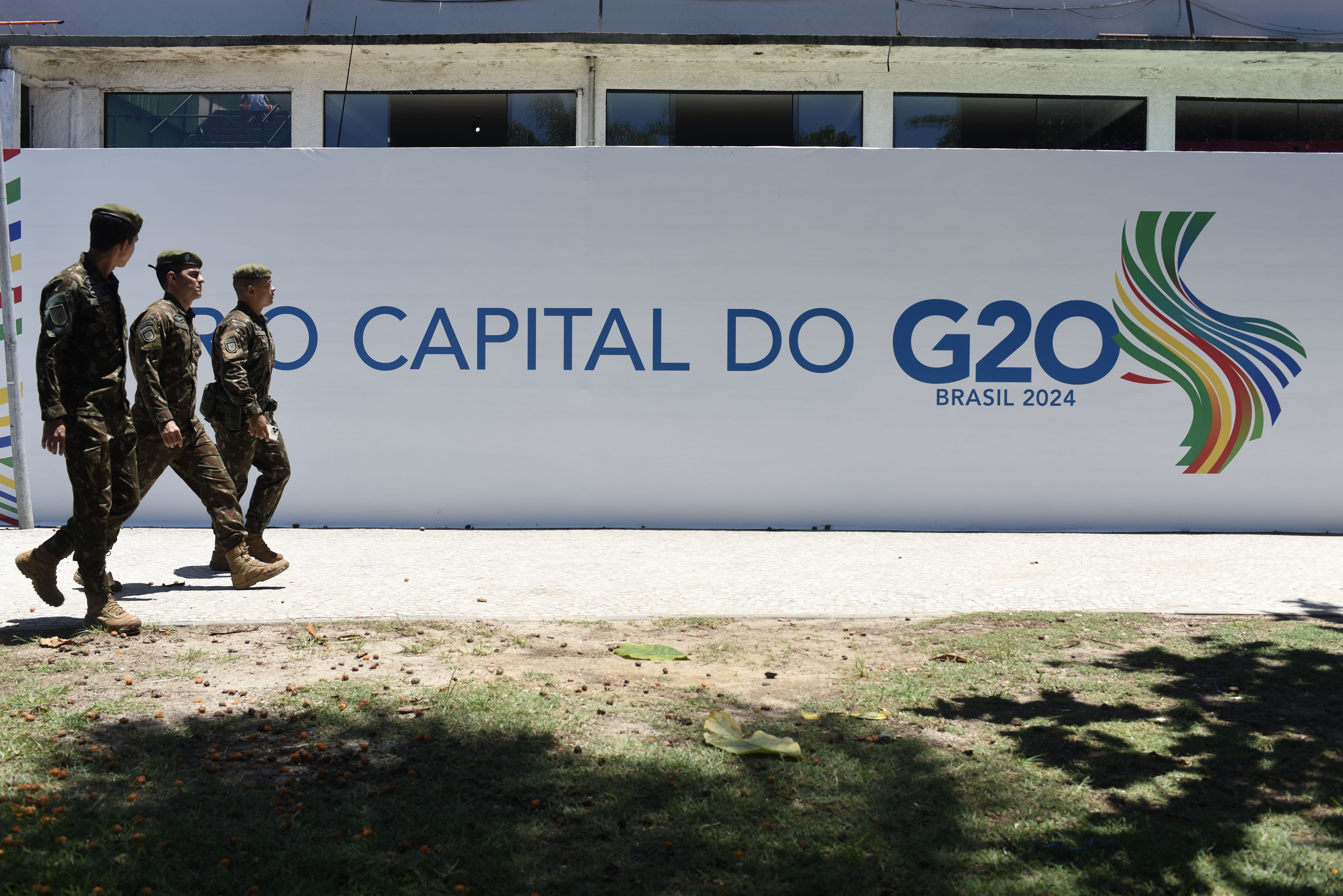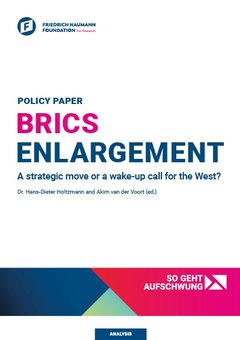G20 summit
Not a walk in the park at Sugarloaf Mountain: G20 summit in Rio de Janeiro

The G20 summit will take place from November 18 to 19, 2024 at the Museum of Modern Art in Rio de Janeiro.
© picture alliance / ZUMAPRESS.com | Ingrid CristinaThe G20 summit next Monday and Tuesday in Rio de Janeiro is unlikely to be a walk in the park for the Brazilian presidency. The meeting of the heads of state and government of the 20 largest economies will take place under difficult conditions.
USA and Germany in times of domestic political upheaval
Last week's US presidential election will inevitably influence the debates in the conference corridors. Although President Joe Biden will be travelling to Rio de Janeiro, the really interesting question is likely to be what positions his predecessor and designated successor Donald Trump will take in the White House from 20 January. Trump's initial announcements do not bode well for closer global cooperation: instead of free trade, there is the threat of new economic wars through punitive tariffs for Europe and China, and instead of a commitment to climate protection and international agreements, the USA is once again likely to pull out of the Paris Climate Change Agreement. Now that the German ‘traffic light coalition’ has effectively ended with the dismissal of Finance Minister Christian Lindner, the incumbent Federal Chancellor Olaf Scholz can only travel to Rio de Janeiro as a ‘lame duck’. This means that the future positioning of two of the world's three largest economies at the summit is unclear.
Long list of challenges and diverging interests
The list of global challenges seems never-ending. Russia's war in Ukraine continues with undiminished vigour, now also supported by soldiers from cash-strapped North Korea. Due to the international arrest warrant against President Putin, he will probably have to be represented by Foreign Minister Sergei Lavrov. The effects of climate change are progressing and while some of the countries present, above all India and Indonesia, are showing impressive growth rates of up to 7 per cent, the economic situation in Germany and Argentina is clearly lagging behind.
President Lula's ambitious agenda
In this challenging and charged environment, President Lula da Silva has ambitious plans for the summit in Rio de Janeiro as the highlight of Brazil's G20 presidency. His agenda focuses on reducing inequality, strengthening South-South cooperation, climate justice and reforming global governance and thus international organisations under the guiding theme ‘Building a just world and a sustainable planet’.
To reduce inequality in the world, Brazil is endeavouring to set up a task force for a Global Alliance against Hunger and Poverty. The aim is to provide resources and knowledge for the implementation of public policies and social technologies that have proven to be effective in reducing hunger and poverty in the world. Joining the Global Alliance will not only be open to G20 members, but to all interested countries. However, it remains questionable whether there will be enough countries that not only pay lip service but also offer financial resources to reduce hunger and poverty. It remains to be seen whether these will then also contribute to sustainable development in the target countries or, as the example of China shows, rather serve their own political and economic interests.
In terms of climate policy, Brazil wants to promote a high-level dialogue between governments, financial institutions and international organisations with a task force for global mobilisation against climate change. The aim here is to improve global macroeconomic and financial harmonisation in order to implement the goals of the United Nations Framework Convention on Climate Change (UNFCCC) and the Paris Agreement. At the summit, as at the COP30 in Belém next year, Brazil will endeavour to present itself as a key country in the fight against climate change. The country in the heart of the Amazon region thus symbolises the ecological challenges facing the world. However, the forest fires, often caused by human overexploitation, are damaging Brazil's image and credibility with regard to its climate targets. This symbolises domestic political conflicts of interest, which other invited states should be more than aware of.
Brazil's priorities in the area of human rights are also still unclear. During the last session of the UN Human Rights Council, for example, the country abstained from voting on resolutions of particular political importance concerning the extension of the commissions of enquiry in Syria and Venezuela and the extension of the mandate of the special rapporteur on the human rights situation in Russia. Brazil only supports human rights in African countries, but not in the rest of the world. The voting pattern on Russia or resolutions introduced by Russia is particularly remarkable in view of Russia's serious crimes. It underlines the fact that President Lula does not want to jeopardise the economic relationship with the Russian president and wants to strengthen his role within BRICS.
Brazil could play an important role as a bridge-builder between blocs
On the one hand, Brazil sees itself as a spokesperson for the interests of the ‘global South’. At the same time, however, Latin America's largest country is also a founding member of the BRICS alliance, which it will preside over next year. In contrast to Russia and China in particular, both of which are also G20 members and BRICS founding states, Brazil's foreign policy and economy are not directed against the West. The country is focussing on diversifying its political and economic interests. Although China is a welcome trading partner for Brazil and an important investor in key areas such as energy and infrastructure, Brazil recently spoke out against official participation in the Chinese Belt and Road Initiative in order to avoid snubbing the USA and the EU.
Finally, it will be interesting to see whether - despite considerable resistance from France - progress will finally be made on the adoption of the EU-Mercosur Agreement, which has now been under negotiation for 25 years, on the margins of the summit. The finalisation of this agreement is long overdue, particularly in view of the increasing geopolitical and economic systemic competition with authoritarian states.
The opportunities that the agreement offers, particularly for European companies with their technological expertise in ‘green reindustrialisation’ in Brazil, i.e. the combination of green hydrogen and renewable energies with the added value of energy-intensive production in Brazil, are also underestimated. It is to be hoped that this realisation will prevail among all European participants in Rio and that the agreement can finally come into force in the near future.
This year's summit is caught between the growing interests of new blocs. While the G7 countries will be pushing to secure existing power structures and protect Western interests, the BRICS countries will be increasingly assertive. They want to use their growing economic and political strength to force the influence of the ‘global South’ and push back the dominance of the West in the world economy and global institutions. At a time of growing geopolitical tensions and economic imbalances, Brazil could not only gain the trust of both blocs through its mediating role, but also become a cornerstone for a co-operative and multipolar world order. However, this task is no walk in the park.
Wide range of activities organised by the Foundation around the summit
The Friedrich Naumann Foundation for Freedom organised several events around the G20 summit in Rio de Janeiro. On 11 November, a symposium was held at the Brazilian Embassy in Berlin on the topic of ‘G20 with a Brazilian twist - What legacy will Brazil's G20 Presidency leave?’, at which the Brazilian Ambassador to Germany, Roberto Jaguaribe Gomes de Mattos, and the Chairman of the Foundation's Board of Directors, Professor Karl-Heinz Paqué, spoke, among others. The Foundation's office in Buenos Aires held a G20 simulation game on 9 and 10 November at the UCEMA in Buenos Aires, where 75 students from 14 Argentinian universities were able to explore the topics of the summit agenda and practise their negotiation skills, and at which Argentina's G20 Sherpa, Federico Pinedo, gave a video address.



